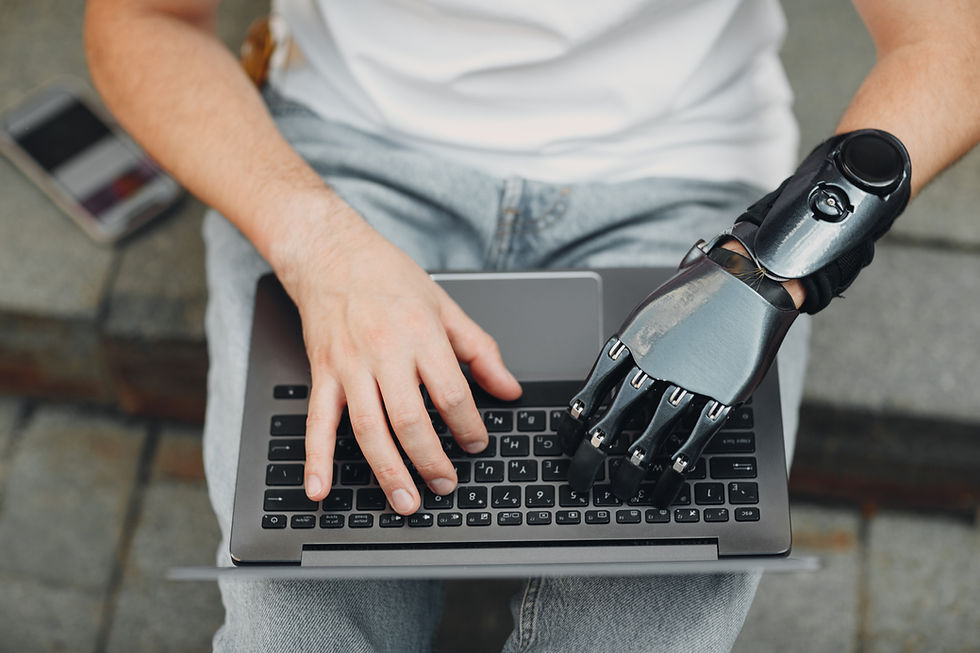Bridging the Gap: How AI Therapists Complement Traditional Therapy Methods
- Dr. dStress
- Sep 8, 2023
- 6 min read

In a world rapidly embracing the digital, mental health therapy—often seen as an intimate and deeply human endeavor—is experiencing a transformative wave. At the heart of this revolution stands Artificial Intelligence (AI), an entity once believed to belong strictly in the realm of sci-fi but now seamlessly integrating into our daily lives. Traditional therapy, with its rich legacy of human connection, understanding, and nuanced interpretation, may initially appear at odds with the binary logic of AI. Yet, as we delve deeper, we begin to see the profound harmony they can achieve together. This article explores the symbiotic relationship between traditional therapy methods and the emerging AI therapeutic tools, uncovering how they don't just co-exist but collectively elevate the therapy experience.

The Value of Traditional Therapy
Mental health therapy has long stood as a bastion of personal connection, understanding, and healing. Its strength lies in several core tenets that have withstood the test of time.
Human Touch and Empathy: Beyond the techniques and methodologies, traditional therapy thrives on the innate human ability to empathize. A therapist, with their lived experiences, intuitions, and capacity to feel, offers a deep sense of understanding that resonates on a profoundly human level. The mere act of being truly "seen" and "heard" by another person can, in itself, be therapeutic.
Complex Problem Solving: While structured approaches are often employed, every individual's psyche is unique. Human therapists are adept at navigating these complexities, often improvising and adapting their methods to suit the individual nuances of each patient. Their ability to discern underlying issues, sometimes hidden beneath layers of expressed problems, is invaluable.
Building Trust and Safety: The therapeutic alliance—the bond between therapist and patient—is pivotal in the healing process. This trust, nurtured over time, creates a safe space where patients can be vulnerable, open, and genuine, fostering deeper introspection and growth.
Cultural and Contextual Sensitivity: Human therapists bring an awareness of cultural, societal, and personal contexts that can influence a person's mental well-being. Recognizing these influences and addressing them within their context is a hallmark of effective traditional therapy.
In essence, while tools, techniques, and methodologies evolve, the core of traditional therapy is anchored in the irreplaceable human connection. It is this very foundation that AI therapies seek to complement, rather than replace, creating a holistic approach to mental well-being.

AI Therapists: What They Bring to the Table:
Artificial Intelligence in therapy isn't an attempt to eclipse the time-tested methodologies of traditional therapy. Instead, it's a new tool designed to enhance, complement, and bridge gaps. Here's a look at the unique advantages that AI therapists offer:
On-demand Availability: One of the most significant advantages of AI therapy is its 24/7 accessibility. Whether it's a midnight anxiety bout or a sudden emotional spike during the workday, AI therapists are there to provide immediate feedback and coping strategies.
Consistency and Objectivity: While human emotions can sometimes be a double-edged sword, AI operates with unerring consistency. This guarantees that the advice and strategies provided are free from any external biases, ensuring a neutral and consistent support system.
Global Accessibility: For many around the world, accessing a qualified therapist either due to geographical, financial, or societal constraints is a challenge. AI therapy apps bridge this divide, offering an entry point into therapeutic practices for countless individuals.
Data-Driven Insights: With user consent, AI tools can track moods, triggers, and progress over time, providing tangible data that can be invaluable for both users and their human therapists. These insights help tailor more effective therapeutic strategies and interventions.
Anonymity and Privacy: For those hesitant to seek help due to the stigma around mental health or personal reasons, AI therapists offer a veil of anonymity. This encourages more individuals to take that first crucial step towards seeking help.
AI therapists are not about replacing the warmth of human connection. Instead, they serve as a valuable ally, ensuring that the benefits of therapy are expanded, enhanced, and made accessible to all, wherever they might be.

Synergy Between AI and Human Therapists:
The interplay between AI and human therapists isn't a story of replacement, but rather one of collaboration. Each brings a unique set of strengths to the table, and when harmonized, the results can be transformative for the patient. Here's a closer look at this symbiotic relationship:
Immediate vs. Long-term: While AI can provide immediate, in-the-moment support and coping strategies, human therapists delve deeper, addressing root causes and facilitating long-term emotional and mental growth. Together, they ensure both immediate relief and enduring well-being.
Screening and Preliminary Assistance: Before a patient steps into a human therapist's office, AI can play a crucial role in initial screenings. By gathering basic information, identifying triggers, and understanding patient history, AI can prepare the groundwork for more focused and effective human-led sessions.
Homework and Practice: Therapeutic growth often involves practices outside of therapy sessions. AI tools can help monitor, remind, and guide patients through these exercises, ensuring consistent practice and feedback.
Feedback Loop: The constant interaction with AI tools allows for an ongoing feedback mechanism. By analyzing this data, human therapists can adjust their strategies, gain insights into patterns they might have missed, and offer more targeted assistance.
Crisis Management: While AI tools can't replace human intervention in severe crises, they can serve as a preliminary support system, offering immediate coping techniques until professional help can be accessed.
The magic happens in the middle ground, where traditional therapy's human touch meets AI's precision, accessibility, and consistency. By leveraging the strengths of both, we are on the cusp of a more inclusive, effective, and holistic therapeutic era.
Case Studies: Real-life Examples
The theoretical synergy between AI and traditional therapy methods is enriched by real-world applications. Here are some enlightening case studies that underscore their combined efficacy:

Remote Rural Regions:
Situation: In remote parts of the world, the scarcity of trained therapists is a pressing issue.
Solution: AI-driven therapy apps have been introduced to these communities as an accessible entry point into therapeutic practices.
Outcome: Many individuals, after initial interactions with AI therapists, were then connected to human therapists via teletherapy, ensuring a seamless continuation of their therapeutic journey.
Post-therapy Maintenance:

Situation: Patients, after a series of traditional therapy sessions, often need ongoing support to maintain their progress.
Solution: AI therapy apps have been used to offer continued support, reminding patients of techniques they learned and providing a platform for daily mental health check-ins.
Outcome: Patients reported feeling more equipped to handle day-to-day challenges and less likely to relapse into old patterns.

Educational Institutions:
Situation: Schools and colleges often struggle with the rising mental health challenges among students but have limited counselors.
Solution: AI therapy tools were introduced as an immediate support system, offering students a way to voice their concerns, learn coping mechanisms, and when necessary, get referred to human counselors.
Outcome: There was a notable decrease in stress-related incidents, and students felt more supported in their educational journey.
Corporate Settings:

Situation: The modern workplace is rife with stressors, but providing full-time, in-house therapy for employees is often unfeasible.
Solution: Companies have integrated AI therapy platforms as part of their employee well-being programs, offering an immediate support system.
Outcome: Employees felt better equipped to handle work-related stresses, leading to increased productivity and a decrease in mental health sick days.
These real-life applications underscore the transformative potential of integrating AI with traditional therapy methods. It's not just about the technology but about creating a web of support, ensuring that no one is left behind in their quest for mental well-being.
Looking Forward: The Future of Integrated Therapy
As we stand on the threshold of a new era in mental health care, the harmonious collaboration between AI and human therapists promises a brighter, more inclusive future. We've seen that neither exists to replace the other; instead, they function best when used in tandem, each amplifying the strengths of the other.
Here's what we can anticipate for the future of integrated therapy:
Wider Accessibility: With the continued development of AI tools and teletherapy platforms, therapy will be more accessible than ever, reaching even the most remote corners of the world.
Personalized Therapeutic Experiences: As AI systems become more sophisticated, they'll be better equipped to offer personalized strategies and insights, which human therapists can then use to tailor their sessions more effectively.
Continuous Innovation: The rapid evolution of technology ensures that we'll see even more advanced and helpful tools in the near future. Virtual reality therapy sessions, more intuitive chatbots, and AI-driven mood tracking are just a few possibilities on the horizon.
Greater Destigmatization: As AI therapy tools become more mainstream and integrated into daily lives, the stigma surrounding mental health care may further diminish, encouraging more individuals to seek the help they need.
In this journey, it's essential to remember that the goal remains unchanged: to provide the best possible support for those navigating the complex landscape of mental health. With the combined power of human expertise and AI precision, we're moving towards a world where mental well-being is not a privilege but a right accessible to all.
.png)
Comentários